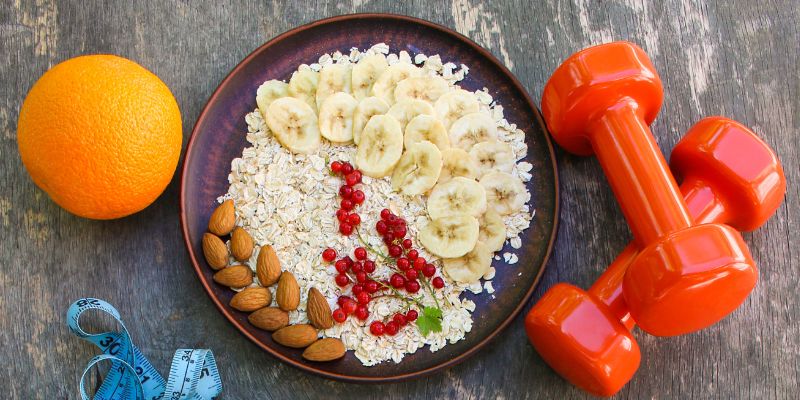Find Out How Much of Each Nutrient You Need Every Day!
Mar 26, 2024 By Madison Evans
You should always strive to consume a nutritious diet. Monitoring one's caloric consumption and avoiding unnutritious balance foods rich in calories is advisable by many experts. However, it could be difficult to determine whether your daily diet contains every nutrient you requirethe following sections detail how to evaluate your present dietary health.
Nutrients You Need In A Day

Calcium
Calcium is essential for preventing medical conditions such as osteoporosis and preserving bone health. It also promotes healthy blood vessels, nerve transmission, and active musculature and is vital for robust bones. Thus, before eating something, make sure to read the label to see if calcium is present.
People should get 1 gram of calcium daily. It seems impossible, but this goal is achievable. For calcium, eat paneer, yogurt, and milk. Completely coyote? Sure, sure. These leafy greens, including broccoli and spinach, may help you lose weight easily and quickly. Get calcium easily with these veggies.
Fiber
One way fiber supports the digestive system is by increasing stool volume, which prevents constipation and facilitates regular bowel movements. However, its utility transcends that particular aspect. Managing blood sugar is crucial for sustaining energy levels and minimizing fluctuations. Fiber helps prevent sugar absorption by inhibiting circulation. It also contains soluble fiber, which fights hypercholesterolemia strongly. Reducing "bad" cholesterol (LDL) reduces cardiovascular disease risk; thus, read the label before eating.
For these benefits, adults should consume 40 grams of dietary fiber daily. Fruits, vegetables, whole cereals, and legumes can easily be incorporated into a fiber-rich diet. To attain the recommended fiber intake, promote digestive system health, and safeguard cardiovascular well-being, consider incorporating legumes into supper dishes, preparing a morning smoothie, or bringing a lunchbox containing whole-grain alternatives. Your closest allies are the following dietary groups.
Magnesium
Magnesium and calcium strengthen bones. Calcium regulation and hormone imbalance caused by magnesium shortage may lead to osteoporosis and other illnesses. Magnesium may reduce heart attack and hypertension; thus, it is necessary to read the label before you eat something.
Experts suggest 410 mg of magnesium daily for healthy body function. For individuals seeking to increase their magnesium intake, nutritionists advise expanding the consumption of nuts, whole grains, wheat germ, seafood, and green leafy vegetables. Understanding the functioning of beans and lentils is also beneficial because they provide optimal magnesium for the diet.
Vitamin E
Vitamin E shields cells from free radical damage through its antioxidant function. However, free radicals break down healthy cells, making people more susceptible to cardiovascular disease and cancer. Vitamin E plays a positive role in defending the organism from different health hazards by supporting the immune system.
Supplementing 15 milligrams of vitamin E daily may optimize one's health. Affordably present in balance foods such as pistachios, eggs, green, verdant vegetables, vegetable oil, and so forth, vitamin E is a straightforward nutrient to incorporate into a daily routine. Vitamin E supplementation following a nutritious diet fosters cellular well-being and confers defense against potential hazards.
Vitamin C
Any sufferer of free radical damage needs vitamin C's antioxidant properties. It forms collagen, which aids joint health and protects. Collagen cushions bones and supports joints, allowing for smooth mobility.
Doctors recommend 7590 milligrams of vitamin C daily. Common meals are high in vitamin C, so this request makes sense. Citrus fruits are known for their vitamin C content, but others exist. Vitamin C comes from a nutrient-dense balance foods and vegetables.
Vitamin A
In all nutrients, vitamin A is central in promoting optimal eye health and cellular development. It is indispensable for ocular health, maintaining healthy tissues, immunity, and inflammation, and fostering radiant skin. It promotes red blood cell synthesis, aids in bone development, and is involved in the regulation of epithelial and mucosal tissues.
One should consume 600 to 900 mcg of vitamin A every day. Examining your food consumption may reveal where you can get vitamin A. Balance foods rich in vitamin A include sweet potatoes, carrots, spinach, and other dark green lush veggies. Add these items to your meals to increase your vitamin A consumption and have a balanced and healthy diet.
Vitamin D
In all nutrients, vitamin D improves calcium absorption. Regularly taking it can maintain bone health. It also regulates insulin action and blood sugar to help build muscle. For healthy exercise, most doctors recommend 600 IU per day.
Vitamin D is abundant in the sun, and there are a variety of foods for those interested in its sources. Prominent sources of nutrition include fatty seafood such as tuna and salmon, dairy products, and eggs. Particular mushrooms contain this mineral as well. The early morning sun remains the only way hormones deep beneath the epidermis stimulate vitamin D production.

Potassium
Several physiological mechanisms rely on potassium, one of the electrolytes that must be present in the body. Since potassium maintains electrolyte balance, this has been directly linked with blood pressure management.
Potassium also plays a critical role in kidney function by decreasing the chance of blood clots and promoting arterial blood vessel dilation. To put it in the figure, this is close to 4.7 grams per day. Pounding foods include lima beans, potatoes, yams, avocados, and Swiss chard. Eating more low-fat dairy products may help you maintain your nutritious diet and improve your health.
Protein
Protein Building and repairing tissues in the body requires protein. It is sufficient for muscle development and cell repair. Individual needs determine the specific daily protein requirement, ranging between 46 and 56 grams.
Consuming foods such as milk, curd, paneer, eggs, lean poultry, soy, and legumes ensures adequate protein intake. Protein from these sources is vital for developing robust muscles and maintaining normal bodily functions.
Iron
The transportation of oxygen to all areas of the body is primarily the function of iron, a vital constituent of RBCs. A deficiency in blood iron leads to anemia, characterized by impaired oxygen transport within the body and subsequent feelings of lethargy and fatigue. An iron intake of 18 grams per day is recommended.
Pomegranates, green, verdant vegetables, seeds, legumes, lentils, and whole cereals are excellent sources of iron. Preventing iron deficiency with these foods is highly beneficial, facilitating improved oxygen transportation and vitality levels.

Struggling with Skin Picking? Here’s How to Break the Cycle!

Discovering the Nutritional Perks of Tapioca

Timing Your Caffeine: Identifying the Ideal Moments for Coffee Consumption

How To Ensure Weight Loss With The Right Diet?

Sweat and Germs: The Ugly Truth About Ignoring Equipment Cleanliness

Easy Workouts for Health and Weight Loss: A Comprehensive Guide to Fitness

Unhealthy Foods For Fatigue


